Research Centers, Labs & Programs
Research Entities Based in the College of Letters & Science

Center for American Indian & Rural Health Equity
As a research center for the people of Montana, CAIRHE epitomizes the service mission of our state's land-grant university. Our investigators and their partners work diligently in Montana’s rural communities and on tribal lands to design health equity research and health interventions that improve quality of life and, ultimately, save lives.
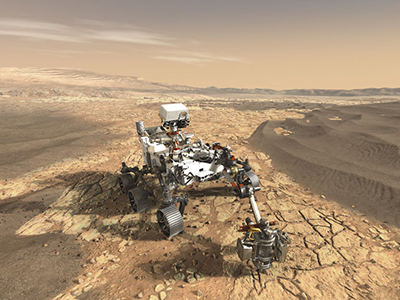
Center for Science, Technology, Ethics & Society
The mission of C-STES is to produce interdisciplinary knowledge and critical thinking about the social and ethical dimensions of science and technology through research, teaching, and public engagement.
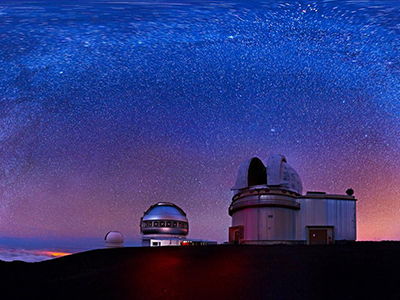
eXtreme Gravity Institute
XGI strives to further our understanding of astrophysics and fundamental physics through extreme gravity phenomena. The merger of black holes and neutron stars, isolated and binary pulsars, cosmology in the early universe, and the accretion disk of supermassive black holes are examples of phenomena at the frontiers of science, where the potential for new discovery is unfathomable.

Ivan Doig Center for the Study of the Lands and Peoples of the North American West
The mission of the Center is to foster the integrated study of the North American West. With its emphasis on developing connections between the humanities, arts, social sciences, and natural sciences, the Center helps position MSU as an important site for convergent scholarship.
Affiliated Research Entities
Faculty in the College of Letters and Science work in interdisciplinary research centers, labs and programs across campus.
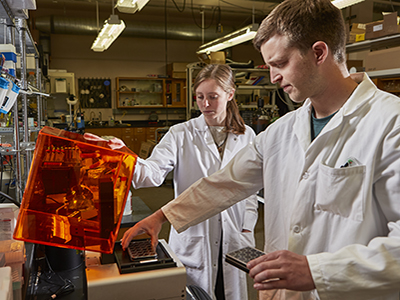
Center for Biofilm Engineering
The CBE advances the frontiers of health, energy, industry, and the environment through biofilm research, education, and outreach.
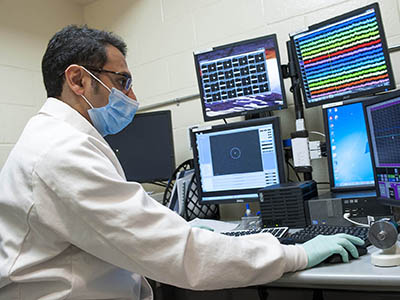
Center for Mental Health Research & Recovery
The Center for Mental Health Research and Recovery's vision is to establish an academic center of excellence that addresses the mental health challenges of Montana and similar rural states by advancing mental health prevention, diagnosis, treatment, and workforce development.
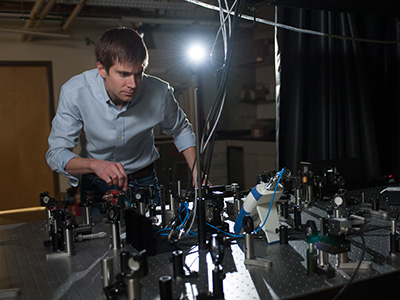
Energy Research Institute
The Energy Research Institute involves an average of over 200 people annually in energy investigations in a wide variety of fields including basic energy science, bioenergy, fuel cells, smart grid and controls, energy efficiency, renewable energy, and carbon sequestration.

Montana Space Grant Consortium
MTSGC works to strengthen education in Montana in NASA-related fields. In addition, the program works toward NASA STEM Engagement priorities. To accomplish the overarching goal, MTSGC offers a set of student and faculty opportunities geared toward hands-on projects and other effective engagement styles.
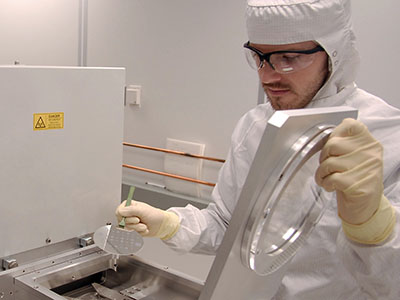
Optical Technology Center
The Optical Technology Center is a multidisciplinary center offering opportunities for students, faculty, industry and other interested partners to learn and work together to find solutions to practical problems and to discover new applications for optical technology.
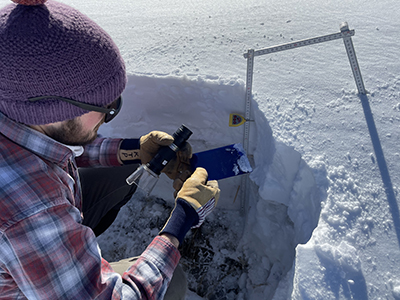
Spatial Sciences Center
SSC's mission is to promote and support basic and applied research incorporating geographic information science, remote sensing, global positioning system, and spatial analysis; support and facilitate undergraduate and graduate courses in spatial sciences offered through several departments across MSU; and promote the application of spatial sciences at MSU through outreach to faculty, students and staff.
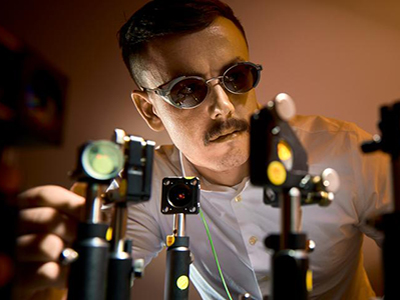
Spectrum Lab
The Spectrum Lab was established in 1999 to advance the optoelectronic technologies emerging from the research laboratories of Montana State University, foster their transition to Montana companies, and provide enhanced educational opportunities for our undergraduate and graduate students.
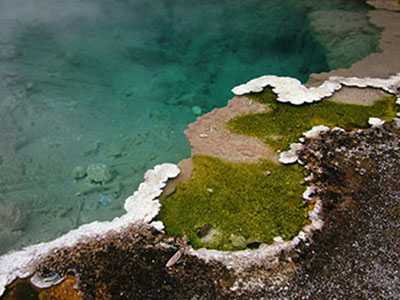
Thermal Biology Institute
TBI is a multidisciplinary team of scientists forging a new path in scientific discovery focused on the unique thermal environments within Yellowstone National Park. TBI is comprised of 15 faculty representing expertise in biochemistry, geochemistry, microbiology, virology, mycology, ecology, plant physiology and environmental physics.
Research Core Facilities in the College of Letters & Science
The Cryo-EM core facility at Montana State University is a regional facility that brings state-of-the-art cryo-EM capabilities, including single particle analysis and cryo-electron tomography, to the Northern Rocky Mountains. Instrumentation includes a 200 kV Talos Arctica with a Gatan K3 camera, a 120 kV Tecnai Spirit, and a Vitrobot Mark IV. Collectively, these instruments allow imaging of biological structures at single nanometer to subnanometer resolutions and thus enable 3D modeling of cells, viruses, proteins, nucleic acid and other soft matter at the atomic level.
Director: Martin Lawrence
The Geospatial Core Facility (GCF) is a collaborative space for geospatial research and education across MSU and beyond. Equally adept in the field or lab, the GCF integrates expert knowledge with cutting-edge technologies, advanced sensors, drones, high-performance computing, and software to capture geospatial data, enabling new and insightful research, teaching, and outreach. The goals of the GCF are to expand interdisciplinary research, support external funding, grow educational and outreach opportunities, and develop partnerships in Montana and beyond. The GCF welcomes ideas, questions, and collaborations from all research and teaching disciplines, community partners, and stakeholders.
Director: Eric Sproles
ICAL is a mid-sized, user-oriented core facility that supports basic and applied research in all science and engineering disciplines at MSU, collaborating universities, and industrial partners. This facility co-locates all electron-, X-ray-, and particle-beam instruments within a single core facility, allowing for economies of scale through centralized scheduling, training, maintenance, expertise and operation of these instruments, and provides greater visibility and access to instruments by students and faculty across the STEM disciplines.
Director: Recep Avci
The mission of the Proteomics, Metabolomics and Mass Spectrometry Facility is to seed methods, technology, and training to students and research labs at Montana State University and affiliated programs. The facility offers a full range of services, from small molecule identification to the complete characterization of complex biological mixtures such as soil and serum.
Director: Brian Bothner
MSU’s Nuclear Magnetic Resonance (NMR) Core Facility houses four high-field solution NMR spectrometers that are employed to characterize the molecular arrangements and dynamic properties of small molecules, natural products, chemical synthesis intermediates, polymers, and biomolecules, including proteins, nucleic acids, carbohydrates and small molecule metabolites. The NMR Core provides diverse services and access to state-of-the-art NMR instrumentation, and serves the needs of a diverse group of users, including on-campus and off-campus academic researchers, industrial partners. The core is actively engaged in the training and education of both undergraduate and graduate students, and postdoctoral trainees. The NMR Core Facility works closely with MSU’s Mass spectrometry Proteomics and Metabolomics Core Facility to offer an extensive and integrated approach for solving complex chemical, biological, and biochemical scientific problems and for training students in interdisciplinary life science research.
Director: Valerie Copie
Other Research Services in the College of Letters & Science
The Human Ecology Learning and Problem Solving (HELPS) Lab is a fee-for-service facility at Montana State University-Bozeman that enables the collection of high-quality data for researchers using a variety of social and behavioral methods. The HELPS Lab specializes in data collection involving human subjects.
Director: Eric Raile
We offer assistance and collaboration through the entire research process, including general discussions regarding the role of statistical inference in your research:
- Research Planning/Design: Refining of research questions and objectives; study design (experimental, sampling, survey, observational, …); analysis planning; planning for data organization and management; assistance with developing research proposals; etc.
- Analysis: Aligning statistical methods and models with research questions and design; exploratory data analysis and creative visualization of data; assistance in understanding and translating assumptions underlying models and methods; interpretation of statistical results.
- Dissemination: Assistance with graphical and tabular displays of data and analysis results; interpretation of results in the research context; wording related to design, methods, analysis, and interpretation; writing about statistical inference used in the research; communicating about the benefits and limitations of the use of statistics in scientific research; etc.
Interim Director: Greta LInse
